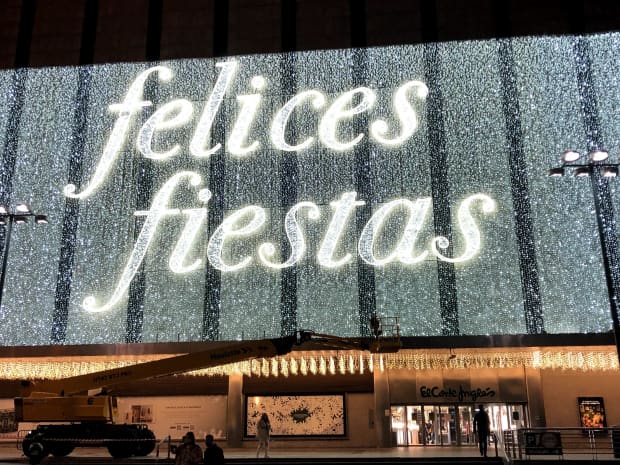
The Four Seasons Hotel (pictured left) near Madrid’s Puerta del Sol on Nov. 17, 2020.
Kollmeyer/MarketWatch
For 41 years, families in the Spanish capital of Madrid have kicked off the Christmas holidays by gathering behind the big El Corte Inglés department store to watch giant, singing puppets.
The store’s “Cortylandia” show has treated festive crowds in the past to depictions of Gulliver’s Travels, Noah’s Ark and Aladdin among many others. But this year, as all the world battles a killer virus, the tradition has been replaced with a light display that simply reads: “Merry Christmas.”
The loss of a beloved 15-minute puppet show is among traditions in the traditionally Catholic country being altered or even eliminated, as the government tries to stay a step ahead of its physically demonstrative people, and a virus that has killed 45,069 to date here.
Spain’s lengthy holiday season lasts roughly a month — a marathon of family and friend gatherings — ending on Jan. 6, with the Feast of the Three Kings, which is traditionally the biggest gift-giving day in the country. On Jan. 5, families line city towns and streets all over the country to watch the Kings’ Day parade, whose roots date to the 1800s. But that crowning glory of the season has already been canceled or switched to virtual in many places.
The local government in Madrid, a region that has been hit hardest by both waves of the COVID-19 pandemic, recently embarked on a dour holiday information campaign, with messages such as: “Family gatherings without protection could bury your grandmother,” or “Breaking the rules could put your best friend in intensive care.”
That is as the past weekend saw crowds pour into Madrid’s center to shop and look at festive lights, as police used barricades and overhead cameras to reduce crowds. In Plaza Mayor, long lines stretched around a much-smaller, traditional Christmas market, which was also hemmed in by blue metal gates.
Spain has tried to sidestep another lockdown, such as the one in the spring that left children trapped indoors for six weeks. Officials have mostly relied on midnight curfews, six-person limits on gatherings, and regional border closures to counter an autumn surge, with schools open throughout and masks mandatory since summer. One possible plan being mulled is 1 a.m. curfews for Christmas and New Year’s Eves, and perhaps an urging against nonessential travel.
Announcing a vaccination plan that will start in early 2021 and involve six major pharmaceutical companies, Spain’s health minister Salvador Illa Roca recently implored a weary population to hang in there. “We understand that everyone is now a little tired of so many months with big restrictions and losses, but…we cannot let our guard down now,” he said.
And there has been some good news. As of Monday, Spain’s 14-day cumulative number of cases per 100,000 population stood at 275.51, inching toward levels not seen in more than a month. Death rates and hospitalizations are also dropping.

14-day rise in new COVID-19 infections.
Spain Health Ministry
Like elsewhere, Christmas will be a crucial COVID-19 test for Spain, where many are clearly happiest in a crowd and big family gatherings are the norm. But while it seems many in the U.S. were blindsided by a warning not to travel at Thanksgiving, holiday expectations appear low here.
Hair stylist David Henry Lesur Depret, who runs two hair salons in Madrid with his partner Atilio Künzle, is planning on a small Christmas in a year that has seen an intense focus on staying well and keeping his businesses going.
Read: Long lines and plenty of limitations on the other side of Spain’s pandemic experience
That is as the year may end on a quieter than usual note, because of the dampening effect the virus will have on what is normally a busy holiday season.
“We are going to stay in Madrid in the house with one friend and that’s it. I don’t want to travel or bring people here,” and that includes a brother in France, he said. “I don’t want to worry about it, so he’s not coming and…he will be alone, but at least he will be safe.”
With such huge uncertainty about what will be possible, it is virtually impossible to plan right now, says Ana Ramos. She and her husband, Jose Alberto Trabanco, own Santa Eulalia, a popular, rustic cafe and bakery near the Royal Theater that boasts high ceilings and glass floors, revealing part of Madrid’s ancient city walls.
Ramos is determined to preserve some traditions and Christmas magic for their nearly 8-year old daughter, while keeping her live-in 97-year-old father-in-law safe.

Behind El Corte Inglés department store in Madrid, on Nov. 21, 2020.
MarketWatch/Kollmeyer
“We’ll try to go for a walk and not be sad,” she said. “It will be Christmas with masks with whatever we need. If we are four in the house, well, we are four.”
But Ramos holds just threads of hope about seeing her parents in Burgos, located in the northern community of Castille and León, currently a highly infected region in Spain with the strictest restrictions. “They can’t leave and we can’t enter and this worries me because I would love to see them for the holidays. I haven’t seen them since August,” she said.
Still, she counts her blessings, which include the steady stream of loyal, local clientele who have kept the cafe going this year. A small Christmas will do, she says.
“You have to think positive, though sometimes it’s hard, I imagine we won’t see them for Christmas, but my parents are well, safe and cared for, and this helps me,” said Ramos.
